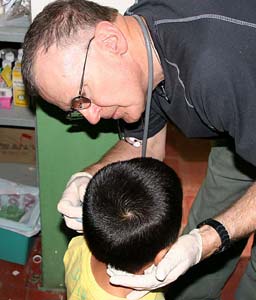South Texas church helps hunters feel at home
Posted: 11/30/07
| First Baptist Church in Cotulla declared the first Sunday of whitetail deer season this year “Camo Sunday” and promoted it that way. Members were encouraged to attend church wearing camouflaged clothing, and about two-thirds did—enough to make any hunter in his or her gear feel welcome. |
South Texas church helps hunters feel at home
COTULLA—Hunting means big business in South Texas, worth tens of thousands of dollars each year to ranchers and the overall local economy. First Baptist Church of Cotulla decided to capitalize on the annual influx of visiting hunters—not for the benefit of their church, but for God’s kingdom.
Pastor Steve Parker recognized what happens every hunting season. The town fills with visitors from all over the world. The county continues to lengthen its airport runway to accommodate ever-larger corporate jets.
After observing this for a couple of years, Parker and other church leaders asked what they could do to minister to local residents who work on the ranches 24 hours a day, seven days a week, as well as to visiting hunters who might be interested in attending an informal worship service.
The church developed strategies to meet both needs. It declared the first Sunday of whitetail deer season this year “Camo Sunday” and advertised it on a sign in front of the church, located on the main thoroughfare through town. Members were encouraged to attend church wearing camouflaged clothing, and about two-thirds did—enough to make any hunter in his or her gear feel welcome.
A couple of out-of-town hunters took advantage and attended the morning worship. To promote the event, the church sent more than 125 invitations to area landowners who live away from Cotulla most of the year.
“Most of these folks are, in one way or another, impacted by the hunting trade. And though they may not have participated in this particular event, they now have a document in their hands that lets them know where First Baptist is and that this church welcomes and appreciates hunters,” Parker said.
During the worship service, Parker told visitors and members, “Every Sunday can be Camo Sunday at First Baptist in Cotulla, because this church loves people, desires for people to worship the Lord, and isn’t so concerned with how people might be dressed when they come to worship.”
As another outreach strategy, the church hosts an informal lunch and Bible study for men every-other Tuesday during hunting season. While it is open to any men, it is scheduled at a time when many who work on local ranches can participate.
Five attended the first Bible study lunch meeting, and Parker shared the gospel and prayed with the men, some of whom had not attended church in a long time because they were unavailable for Sunday services held at traditional times.
“Reaching people impacted by the hunting trade is an uphill climb, and the church will probably not see many tangible results for awhile,” said Jimmy Smith, director of missions in Frio River Baptist Association. “But its members are convinced that God wants them to reach out to the people who live in and visit Cotulla.
“Only God knows where these efforts may lead, but the church seems to be on the right track and is excited about going along for the ride.”



